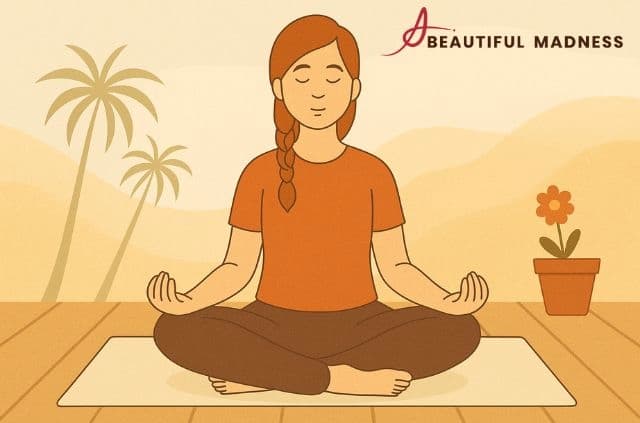You sit down to study, or work- and within 5 minutes your focus is straying, and your mind is somewhere else. A notification pops us, you pick up the phone, and suddenly an hour has passed. On another day, you’re reading a book and have mindlessly read the same paragraph 5-6 times or you can’t sit through 10 mins of a show you used to love.
This isn’t a lack of willpower. It’s just how our brains have been wired now, craving distractions. You want to focus, you want to get things done, but you just can’t. This is exactly where concentration meditation comes in. This isn’t a myth, it’s backed by neuroscience, and research proves meditation can lead to significant improvement in attention, memory and mood. Ready to reclaim your focus? Let’s dive in!
What is Concentration Meditation?
Concentration meditation, or focused attention, is a type of meditation that trains your mind to focus on a single object; sound of your heartbeat, a ticking clock, a candle flame, or even your own breathing. The main goal is to keep bringing your attention back to that same thing over and over again. There are certain activities that can help you increase your focus effectively, including: art, drawing, doodling, painting, sketching, or DIY projects.
Also Read: Therapeutic Power of Mindful Doodling to Release Stress
10 Activities to Help Your Brain to Focus
| Activity | How it helps your brain focus |
|---|---|
| Meditation | Builds attention muscle |
| Reading books | Improves sustained concentration |
| Single-tasking | Stops brain overload |
| Exercise | Boosts blood flow to the brain |
| Healthy diet | Nourishes brain cells |
| Good sleep | Resets and refreshes brain |
| Drink water | Keeps brain sharp and hydrated |
| Short breaks | Prevents mental fatigue |
| To-do lists | Keeps focus clear and goals set |
| Remove distractions | Makes it easier to stay on track |
Benefits of Concentration Meditation
Concentration meditation has a multitude of benefits and studies have proved that it helps you in the following ways:
- Better attention span
- Lower levels of stress and anxiety
- Enhanced memory & cognition
- Emotional balance
- Stronger ability to focus
- Better sleep patterns
How Does Concentration Meditation Work According to Science?
When you start practicing concentration meditation, it literally rewires your brain! Here’s how this happens:
| Mechanism | What This Means | Reference Study |
| Strengthens Prefrontal Cortex | Improves attention, decision-making, and impulse control | Regular meditation increases cortical thickness and activity in the prefrontal cortex. 1 |
| Reduces Default Mode Network (DMN) | Decreases mind-wandering and overthinking | Focused attention meditation reduces DMN activity, leading to better present-moment focus. 3 |
| Enhances Attentional Control | Builds the ability to sustain focus and return attention after distraction | Meditation improves cognitive control and reduces reaction time in attention-based tasks. 3 |
| Boosts Neuroplasticity | Increases the brain’s capacity to rewire and adapt to improved focus habits | Consistent practice enhances neural pathways for self-regulation and concentration. 4 |
How To Practice: A Step-By-Step Guide For Beginners
Now that we know what a powerful tool concentration mediation is, let’s learn how you can perform it. Below are listed some simple steps you can follow:
- Choose a quiet place: This step is extremely important as it is going to help minimize distractions and let you develop deep focus.
- Get Comfortable: As long as you’re not comfortable, it’ll keep bugging you and keep breaking that state of deep meditation.
- Set a timer: Initially managing 5-10 minutes of deep meditation is enough and you can gradually start increasing the amount of time.
- Choose something to focus on: This is the most crucial step. You have to focus your attention on a single object. It can be anything like a ticking clock, your own heartbeat, a flame of a candle, or on your breathing. After that, you have to fixate on that object and make every possible effort to not let yourself lose focus.
- Notice straying: If you notice your attention straying, it is important to not get frustrated or judge yourself and gently guide your attention back to the focused object. Do this every time your mind starts to wander. This is how you actually train your brain to focus on anything for extended periods of time.
- Consistency: It is crucial to repeat this practice every day as this itself is a part of the training itself i.e. returning to the same thing again and again.
4 Hacks to Overcome Common Hurdles
If you want to see the best results, it is of utmost importance to move past any hurdles you might encounter during the course of your meditation training. When you first start meditation it is pretty common to get bored of it, or getting distracted and impatient because it seems like it isn’t working and your focus is still at an all time low.
This is when you need to actively put effort to continue meditating, because once you start seeing results, you’ll get addicted. Here’s how you can overcome these hurdles:
- Keeping your sessions short at first, will help build interest in this practice gradually.
- If you feel like you get distracted easily and can’t control your focus yourself, consider using some apps, timers or even a friend for guidance.
- Schedule a time of the day specifically for concentration meditation. This way you can wire your brain to prepare for a session and make yourself actually look forward to that time of the day.
- Be kind to yourself. If you get distracted or wander around, don’t get frustrated or angry at yourself. This is normal and only gently guiding yourself can help maintain deep focus and meditation patterns. Practice self love and hence, make your self beautiful inside- out.
Ending Note
Concentration meditation isn’t just a trend. It’s backed by scientific evidence as a sure way to sharpen focus and reduce stress and anxiety levels. Simply spare 5 minutes a day and notice your improving emotional wellbeing. Follow the steps, tips and hacks above and see your world change!
Read also: Why is Life So Hard?



